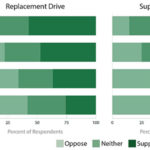
Does the US public support using gene drives to control agricultural pests?
Mike Jones, Sep. 11, 2019 | The development of gene drives is progressing more rapidly than our understanding of public values towards these technologies. Findings from this research can inform responsible innovation in gene drive development and risk assessment....Continue reading "Does the US public support using gene drives to control agricultural pests?"
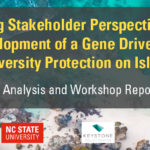
Gene Drive Mice for Biodiversity Protection
Project Background Mice offer an ideal genetic model for exploring the possibility of developing a synthetic gene drive in mammals. As pests, they pose challenges to human health (through disease transmission), agricultural yields and storage,...Continue reading "Gene Drive Mice for Biodiversity Protection"
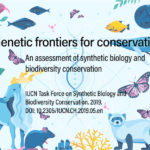
IUCN Report: Genetic frontiers for conservation – An assessment of synthetic biology and biodiversity conservation
Todd Kuiken, May 9, 2019 | Synthetic biology – altering or redesigning genes to meet human objectives – is a fast-developing field with significant potential impacts on nature conservation, according to the Genetic frontiers for conservation assessment report. So far mostly applied in agriculture and medicine, synthetic biology could have substantial knock-on effects on conservation – including modified genes spreading to non-target species and affecting broader ecosystems, but also benefits such as saving threatened species, reduced fertiliser use or diminished demand for products derived from threatened species....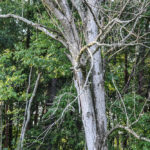
Can genetic engineering save disappearing forests?
Jason Delborne, January 18, 2019 | Forests in the US face many threats: climate change, invasive species, pests and pathogens. Could genetically engineering trees make these plants more resilient?" ...Continue reading "Can genetic engineering save disappearing forests?"
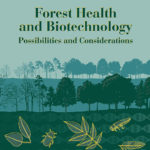
Webinar: NASEM Forest Health and Biotechnology Report Release
The National Academies of Sciences, Engineering, and Medicine will hold a public release webinar for the new consensus report Forest Health and Biotechnology: Possibilities and Considerations on Tuesday, January 8 at 2:00 pm ET. Register below to watch the report release webinar. The recording will be posted 1 week afterwards....Continue reading "Webinar: NASEM Forest Health and Biotechnology Report Release"
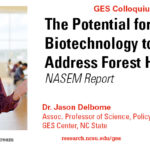
GES Colloquium | Jason Delborne: The Potential for Biotechnology to Address Forest Health
GES Colloquium, 2/19/18 - Jason Delborne | In 2018, the National Academies of Sciences, Engineering, and Medicine formed a committee of experts to explore the potential for biotechnology to address forest health. The committee focused on threats to forest health from pests and pathogens and considered challenges and opportunities of biotech trees (genetically engineered or gene-edited) as solutions. NASEM released this report in January 2019, and Jason participated in the public release of this report in Washington, DC and a session at the AAAS annual meeting to summarize findings of the report....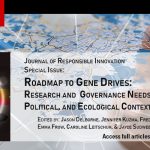
Journal of Responsible Innovation publishes ‘Roadmap to Gene Drives’ special issue
The Genetic Engineering and Society Center at NC State hosted a workshop in February of 2016, supported in part by the National Science Foundation, entitled ‘A Roadmap to Gene Drives: A Deliberative Workshop to Develop...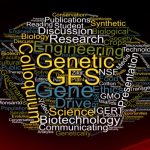
Gene Drives and Responsible Innovation
It is not often that a new technology is at once hailed as a potential solution to pandemic disease, wildlife conservation and hunger, while also being feared as a potential military and environmental “bioweapon.” Gene drives,...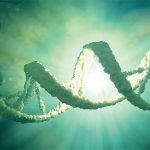
Funders respond to NASEM Gene Drive study
Funders of the National Academy of Sciences consensus study Gene Drives on the Horizon (2016) have published a response to the report in the December 2017 issue of Science. The study summarized "current understanding of the scientific discoveries related to gene drives and their accompanying ethical, legal, and social implications," and was co-authored by Dr. Jason Delborne, associate professor of science, policy and society in the College of Natural Resources and executive committee member of the GES Center....Continue reading "Funders respond to NASEM Gene Drive study"

Jason Delborne appointed to National Academies Forest Biotech Study Committee
Dr. Jason Delborne has been appointed to the National Academies of Sciences provisional committee on The Potential for Biotechnology to Address Forest Health, or Forest Biotech Study. The study will be looking at the potential uses of biotechnology to mitigate threats to forest tree health, identify ecological, ethical, and societal implications of using this technology in forests, and develop an agenda to address knowledge gaps in its application. ...Continue reading "Jason Delborne appointed to National Academies Forest Biotech Study Committee"
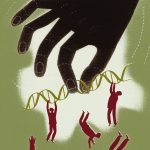
Jason Delborne addresses CRISPR gene drives controversy in NYTimes, Quanta, and Gizmodo
GES Faculty member Jason Delborne addresses two controversial new papers in several articles published this week on the safety of field testing CRISPR gene drives in the wild. With links to articles in New York Times, Quanta, Gizmodo and The Atlantic....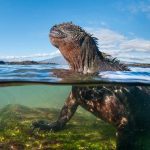
Scientific American: Could Genetic Engineering Save the Galápagos?
Campbell first became intrigued by the possibilities of gene drive in 2011, when he sat in on a conference call between biologists at NC State University and officials of the U.S. Fish and Wildlife Service to discuss a possible genetic approach to control a runaway mouse problem on Southeast Farallon Island, about 20 miles west of the California coast, near San Francisco. John Godwin, a North Carolina State neurobiologist who studies animal behavior, had learned of the Farallon issue while skimming the Internet in 2011. He happened to be at a university with an established infrastructure dedicated to experimenting with—and considering the ethical implications of—genetic manipulation....Continue reading "Scientific American: Could Genetic Engineering Save the Galápagos?"

Godwin and Delborne discuss CRISPR and ethics at NC Museum of Science
GES faculty John Godwin and Jason Delborne were at the NC Museum of History on 9.28.17 discussing genetic biocontrol of pest populations, such as CRISPR gene drives to eliminate invasive rodents from islands to protect endangered seabirds. See PowerPoint presentation & livestream video (including slides)....Continue reading "Godwin and Delborne discuss CRISPR and ethics at NC Museum of Science"
